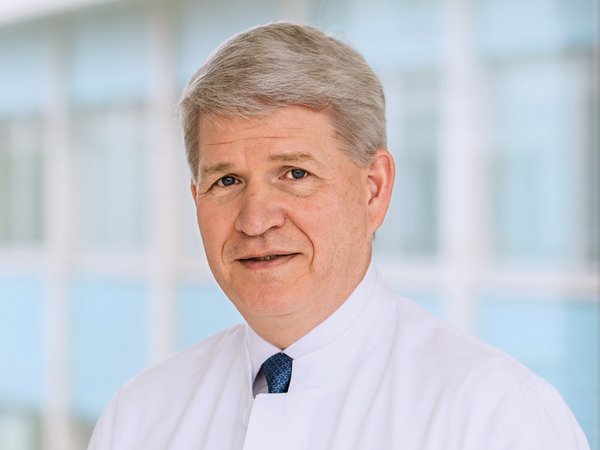Ärztlicher Direktor
Prof. Dr. Ulrich Humke
Telefon: 0711 278-33801
Telefax: 0711 278-33809
E-Mail: u.humke@klinikum-stuttgart.de


In Germany, around 40,000 men are diagnosed every year with prostate cancer. This cancer is now for men the most common cancer and the third most common cancer cause of death in recent decades, this disease has been ever further explored, so that the examination and treatment methods have increasingly improved and refined. All the more important for an optimal treatment appears the experience of large Prostate Cancer Centres such as the urological clinic at St. Catherine’s Hospital and its treatment partners We consider ourselves as a competence centre, where not only the organ is treated, but also the particular situation of our patients is taken into account and individual consultation is offered.
At the Prostate Cancer Centre in Stuttgart Hospital specialists work together for interdisciplinary diagnosis and therapy:

Ärztlicher Direktor
Prof. Dr. Ulrich Humke
Telefon: 0711 278-33801
Telefax: 0711 278-33809
E-Mail: u.humke@klinikum-stuttgart.de
From diagnosis to therapy
Imaging diagnostics
Therapy of prostate cancer
Specifics after the operation
Tumour conference
The individual therapy for each patient is discussed in the multidisciplinary weekly tumour conference based on the available data and is communicated in writing as a proposal to the referring physician and the patient.
Therapy planning
In case of surgery, individual planning follows taking into account on one hand all tumour parameters. On the other hand, the patient’s age and general condition are a deciding factor for the risks to be expected during or after anaesthesia, which must be therefore clarified, if necessary, prior to the operation. Since prostate cancer grows slowly, such preparations are usually quite possible. Therefore, the advantages and disadvantages of surgery should be weighed carefully and, where appropriate, irradiation may be chosen as an alternative therapy.
Two important functions may be affected by the surgery or radiation of prostate cancer: 1. the ability to retain water (continence) and 2. the erectile function (ability of penis hardening). Through increasing knowledge regarding anatomy in the pelvis and functional correlations, surgical techniques have been considerably refined in recent years, so that dysfunctions are not usually permanent. At the same, more careful use of radiation therapy has been succeeded with modern technology. With both methods, the functional results and thus the patient’s quality of life have increased.
Histological examination
The microscopic examination of tissue samples with classical and immunohistochemical methods is on one hand necessary for diagnosis and describes the malignancy degree of the prostate cancer. On the other hand, the examination of the surgical specimen shows the extent of the tumour and determines whether a removal of healthy tissue has been achieved.
Hormone therapy
Hormone therapy is the therapy of choice in case of more risk factors and in case of advanced disease as a very effective and gentle treatment with less stress for the patient.
Chemotherapy
A chemotherapy is individually tailored to the patient in an advanced disease stage, based on guidelines.
Psycho-oncological care
The diagnosis of cancer for affected men and relatives poses an extreme burden. Existential anxiety, worry and despair may appear. Hospitalization, treatments and possible side effects are experienced as stressful. Also in follow-up, questions arise as to what to do next and how life will develop after the disease. All patients can get consultation and support from the professional psycho-oncology team. Together, individual goals are defined.
Studies
To improve the treatment of patients with prostate cancer, the Prostate Cancer Centre of Stuttgart Hospital is involved in multi-centre therapy studies in which patients may participate, if desired.
Quality
Our task is the guideline-oriented and quality-assured treatment of all prostate cancers. The Centre meets the requirements of the German Cancer Society (DKG) for prostate cancer centres and is currently in the certification process. The result quality is regularly inspected internally and externally in collaboration with the oncology focus of Stuttgart.
Urological department, outpatient clinic
Consulting hours daily by appointment
Telephone +49(0)711 278-33890
Radiology department, outpatient clinic
Consulting hours by appointment
Telephone +49(0)711 278-34278
E-Mail k.feilhauer@klinikum-stuttgart.de
Cooperation partners and rehabilitation centres
The Prostate cancer centre works closely with the following partners:
Certified Prostate Cancer Centre
Klinikum Stuttgart - Katharinenhospital
Kriegsbergstrasse 60
70174 Stuttgart
Germany
Telephone +49(0)711 278-33801
Telefax +49(0)711 278-33809
E-Mail s.wagner@klinikum-stuttgart.de